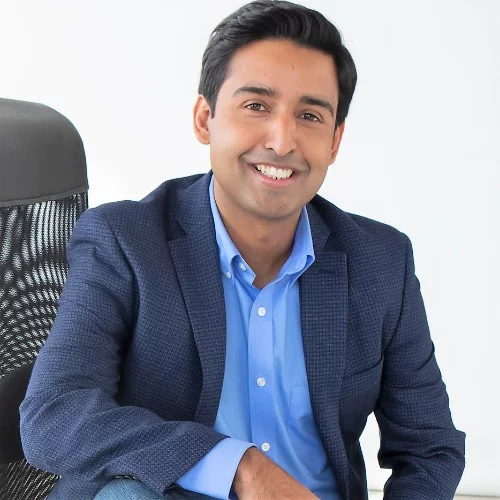Ahead of the IBM CDO Summit, Corinium’s Chief Data Officer Community Director, James Bowater, sat down with Dipti Patel-Misra, Chief Data & Analytics Officer at Vituity, for an interview to get her take on the latest Data & Analytics trends and their impact on the healthcare industry.
Dipti leads the data analytics team at Vituity with more than 15 years of success in designing and implementing data and analytics strategies for business growth in healthcare. She specializes in simplifying complex issues to drive enterprise strategic objectives and is passionate about impacting healthcare outcomes and empowering leaders to engage and change the healthcare landscape. Dipti is a member of the North Carolina Hospital Association Quality Center Board, the chairperson of the Health Informatics Board at UNC Charlotte, and is leading the effort to build an innovation lab (an industry-academia partnership). She also teaches Health Informatics as an adjunct faculty at UNC Charlotte.
James Bowater: Like many industries, data and analytics has the potential to revolutionize healthcare, what impact has the explosion of data and the advancement of analytical techniques already had on the sector do you think?
Dipti Patel-Misra: Great question. In healthcare, especially with a push for digital data and real time date from multiple wearables and devices, the impact it already has had is in trying to really look at things that can deliver results at the time of action. Whether it’s patient outcome improvement, patient satisfaction, or even in some kind of personalized decision making in terms of diseases or disease pathways, there is a lot of powerful insights that data in healthcare has impacted.
I look at healthcare not just as medical care, but overall healthcare. So in improving how people could use the information to better improve mid, body, and soul. With devices like the fitbits, smart watches, having all of this information coming in and coming to you in real-time, or having a diabetes or blood pressure monitor equipped with Bluetooth, so it gets information in real-time provide us with the right information at the right time. All of these technologies combined with data are having huge impact to healthcare from where we were a few years ago.
James Bowater: That brings me nicely onto my next question; what do you think we can expect to see in the coming years
Dipti Patel-Misra: I think there is going to be a shift in coming years towards more holistic, personalized, and targeted healthcare. Currently people seek care when they are sick. It is usually addressed by a physician followed by an intervention, prescriptions drugs etc. I think in the future care will involve a combination of genetics, social factors, other aspects of our lives along with medical care leading to a more targeted and personalized care plan.
This care may actually even start before the person realizes they need it. With data, predictive analytics, and AI, in the future we will be able to provide collect data in such a way that we can say, “You know, you’re going down this pathway and you may want to change some things,” that will actually improve health and outcome.
James Bowater: I see, so using predictive analytics to intervene early, and then going back to that old adage in medicine of prevention being better than cure?
Dipti Patel-Misra: Absolutely. All of the big data collection and analysis leads to augmented/ artificial intelligence, and machine learning. I think what it’s initially going to impact is to really simplify some of the processes. Make things easy to understand and change. If you looked at current healthcare overall it’s pretty complex, in terms of trying to understand how to deliver right care at the right time, by the right medical professional. I think that it is the simplification of complex care that data’s going to lead towards. I equate it to the smart phone – there is no training needed for a toddler to start using the smart phone. Behind the scenes are complex algorithms, but the interaction and experience is simple.
James Bowater: Personal healthcare information is one of the most sensitive forms of data that we can hold on an individual. Presumably then, ensuring patient privacy and the security of their data is of vital importance. What do you think the key steps are to protect that information?
Dipti Patel-Misra: I would say that any years ago the financial industry went through something similar in terms of having all the sensitive financial, credit, SSN and other sensitive data, and they were actually able to figure out how to use the data while keeping it secure. There is always a risk when it comes today, goal is to manage it. I think healthcare is going to go through the same.
Everyone who uses any healthcare data need to realize that we are the guardians of healthcare data. We all recognize that most data breaches unfortunately happen because of human error. Our goal should always be to understand – How do we use technology and/or artificial intelligence to help us reduce the risk in terms of data breaches. We also recognize that for certain data we might feel differently about sharing if we can understand the benefits. An example is the sharing of data for research – as seen for cancer or Parkinson’s.
I think we need to find a happy medium here, because you can’t anonymize all data to build algorithms or do treatments. But at the same time, having and using identifiable data comes with a risk. Currently with all the healthcare data collected we are not seeing the benefit. That is where the data conversation will change – when benefits from providing healthcare data will result in significant benefits.
James Bowater: Do you think that the public will feel comfortable with the idea of all this data being held about their health? If you look at the recent scandals such as Facebook & Cambridge Analytica, some people seem to suggest that people aren’t really that bothered. Do you agree with that? And do you think it’ll change in the future as people become more familiar with data and concepts around data?
Dipti Patel-Misra: As I said earlier I’m not currently feeling that having my healthcare data along with other data sets out there is actually benefiting me personally. So the more we start seeing companies being able to say “We have your data and we’re actually going to be able to predict your outcomes, or able to provide you with personalized service, or reduce the amount of time you wait at the physician office, or make your life easier in terms of getting treatment and here is what you can do.” There is some risk to data being out there, but when the benefits will start outweighing, I think we’ll all get more comfortable, it is still many years away.
James Bowater: I know at the upcoming IBM CDO Summit, you’re going to be speaking on “Making Data Impactful by Delivering Value to your Organization”. In healthcare, data has both a clinical value, and a business value. So, focusing on the clinical side of that first, what work have you done around improving patient outcomes and satisfaction at Vituity?
Dipti Patel-Misra: For folks who may not know Vituity, we’re a completely physician-owned practice management company with over 4,000 clinicians at roughly 185 sites all over the U.S. And so impacting patient outcome through clinical care is probably easier for us because we have all the physicians who’re actually asking us to build solutions for them to utilize for clinical decision support. We also are able to impact physician behaviour.
We’ve roughly over 36 tools in place and almost all of our tools and solutions are all real-time clinical decision support tools for our physicians to utilize. I’ll give a very simple example, because it’s frequently used.
Everyone in healthcare is trying to reduce the number of revisits in the emergency department. At Vituity, what we’ve done successfully is to identify these patients in real time. Using both historic and real time information, we have built out an algorithm.
The results are then displayed in real-time to informs the clinician that this person has a high chance of coming back, along with the reasons why we think they have a high chance. This allows them to utilize the information to reduce the likelihood of them returning, by ensuring the right intervention at the right time. So all of our solutions that we’ve put in place have an outcome base – they are changing the process, not delivering just insights from data.
James Bowater: And switching to the other side of that, to look at the business value of data. Demonstrating the business value to the wide organization can be a challenge that many CDOs and CAOs face. What steps have you taken to communicate that value?
Dipti Patel-Misra: Any project that we actually undertake, before we even embark upon exploring the data, we put out what the business reasoning is and what value would be derived. We will look at a process and ask, “Okay, this is the process that we want to change, and if we change this process, this is the expected outcome that we’re looking for.”
So there’s a couple things that we try and do, first and foremost we actually have a very rapid cycle development process. In doing so, we fail very quickly, so that we’re not spending time/ money and resources building something and having it not succeed. In that way, we’re reducing our time for learning as every failure, gives us an opportunity to learn.
Secondly as we gather data build out the algorithm, we take the insights that come out a step further and say, “Okay, what process change does this insight have to drive to make it realistic?”
Lastly once a process change has been in place, we continuously evaluate and improve. Each of our tool and solution actually has a process change that goes with it. And thus then, on the other side, in six months to sometimes a year, you actually are able to see both the explicit and implicit value of what this is delivering. If the process is not going to change by our insightful predictive model, we often don’t pursue it.
James Bowater: So it’s about prioritizing, and as you say failing fast and making sure that there is a procedural, or process driven outcome, that it’s going to deliver in order to make it worthwhile.
Dipti Patel-Misra: Absolutely. Fail, fail quickly, and put process implementation so the insight’s driving the process change. And then, of course, you want to make sure there are the champions who understand the business needs, the stakeholder who will help drive its success, because it is a large part of change management. Any process is going to have that. But for us, that’s the easy part because we completely physician-owned.
James Bowater: Picking up on that kind of change management piece. Part of the journey is going to be focused on driving cultural change within practitioners. Have you faced much resistance when trying to embed a data-driven approach, and if so, how have you tried to overcome that?
Dipti Patel-Misra: I’ve had roughly 20-years of experience in healthcare and before I had actually joined Vituity, I think most of the companies in healthcare, build great analytical solutions. Building the solution was probably the easiest part. Implementing it and getting clinicians and/or others to actually utilize it the hard part.
Part of what I started to recognize after I’ve been at Vituity is that when you build a solution, you should base it on an understanding how it will be utilized by the person most likely to utilize. What happens in some scenarios is a great tool and solution is built, but it’s not built with the person who’s actually going to use it in mind resulting in the fact that it is more burdensome for them to use it creating a barrier to adoption.
I’ll use an example of a GPS, if it did not give you a warning ahead of making a turn and told you only when you needed to make it you would probably say, “You know, I’m not really interested in the GPS, because I really want to know in advance.”
In the same way, when we become part of the decision making, of saying, “You know if you build this, this is how I would utilize this. And this will make my life easier,” I think those solutions have a much better adoption from the practitioners and that actually drives change. Empowering users to be decision makers in the tool conceptualizing phase they actually embrace it, own it and feel like it was made for them to make their lives easier.
James Bowater: My final question, and this can be from healthcare or any other sector. What do you think is the most innovative use of data and analytics that you’ve seen in the last year?
Dipti Patel-Misra: So I’m fascinated with a lot of the data analytics research, publications and new concepts. Even things as simple as facial recognition get me energized, because a lot of folks that I know have taken the facial recognition a step further to say, “Can we recognize moods, and are we able to help somebody when they’re going down a depression route, or might need help?”
So I look at everything and saying, “How is this technology, data, AI going to evolve and how will help drive change.” Whether it’s self-driving cars, or whether it’s a robot that helps. I know there are a lot great innovations, but as you can probably tell I’m very passionate about healthcare. So I will talk about two recent innovations that I have seen.
One truly is personalized care; there are a number of companies who are taking in the genetic information with other data elements, health factors, along with what people eat and their medical history, to do personalized targeted care. I think that is where the industry is headed.
And the other example is one at Johns Hopkins. They actually put what is a data-centric hospital system. So they’re able to monitor the beds, the patient flow, along with many other process drivers. Not just the flow of patients, but also the flow of information. And they’ve been able to use this information to drive reduction in wait times and outcomes.
If one is to compare with another sector say manufacturing or retail you’d wonder why this is so innovative in healthcare. Healthcare is still lagging behind in terms of similar innovation. But I think, for us in healthcare, the recent push for getting all of this data and information, and having it at our fingertips is actually going to change how we expect healthcare to be driven.
We expect, if we go to an emergency department, that we will be some wait. There now is enough information in real time to administer care in a different manner such as tele-medicine. In the future there may even be a drones bringing in medication or a self-driving ambulance.
So as I look at all the innovation currently taking place in healthcare between technology, collecting the data, predictive algorithms and having ML/ AI that all this will revolutionize healthcare.
James Bowater: Absolutely, and I suppose you could have not only self-driving ambulances, but you could have algorithms that predict where they should be placed and where the calls are most likely to come from for those ambulances. Really starting to combining different technologies to make a healthcare system that we probably won’t even recognize in 25 years time.
Dipti Patel-Misra: Exactly. I think sometimes when we talk of healthcare, we talk of healthcare as a third party thing. As we start owning healthcare, and understand that it impacts each and every one of us, we will start taking a more active role. I think the more we expect and look for these, the better solutions will be built and delivered.
James Bowater: Absolutely. Well, on that positive note, I’ll say thank you very much for taking the time to speak with me today, Dipti.








